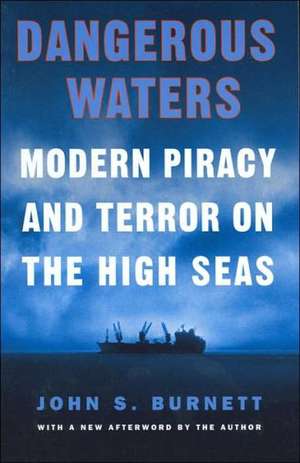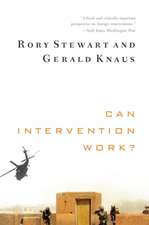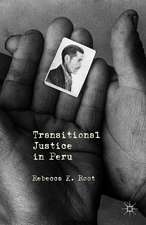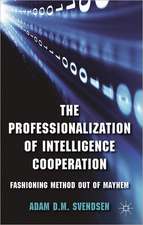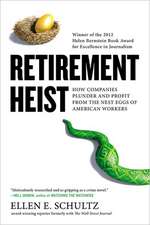Dangerous Waters
Autor John S. Burnetten Limba Engleză Paperback – 31 aug 2003 – vârsta de la 18 ani
While sailing alone one night in the shipping lanes across one of the busiest waterways in the world, John Burnett was attacked by pirates. Through sheer ingenuity and a little bit of luck, he survived, and his shocking firsthand experience became the inspiration for Dangerous Waters.
Today's breed of pirates are not the colorful cutthroats painted by the history books. Unlike the romantic images from yesteryear of Captain Hook, Long John Silver, and Blackbeard, modern pirates can be local seamen looking for a quick score, highly trained guerrillas, rogue military units, or former seafarers recruited by sophisticated crime organizations.
Including new, up-to-date information for the paperback edition, Dangerous Waters is both a dauntless investigation and an epic, breathtaking modern tale of the sea.
Today's breed of pirates are not the colorful cutthroats painted by the history books. Unlike the romantic images from yesteryear of Captain Hook, Long John Silver, and Blackbeard, modern pirates can be local seamen looking for a quick score, highly trained guerrillas, rogue military units, or former seafarers recruited by sophisticated crime organizations.
Including new, up-to-date information for the paperback edition, Dangerous Waters is both a dauntless investigation and an epic, breathtaking modern tale of the sea.
Preț: 137.12 lei
Nou
Puncte Express: 206
Preț estimativ în valută:
26.24€ • 27.30$ • 21.66£
26.24€ • 27.30$ • 21.66£
Carte disponibilă
Livrare economică 24 martie-07 aprilie
Preluare comenzi: 021 569.72.76
Specificații
ISBN-13: 9780452284135
ISBN-10: 0452284139
Pagini: 368
Dimensiuni: 140 x 216 x 20 mm
Greutate: 0.35 kg
Editura: Plume Books
ISBN-10: 0452284139
Pagini: 368
Dimensiuni: 140 x 216 x 20 mm
Greutate: 0.35 kg
Editura: Plume Books
Cuprins
Dangerous Waters Prologue: The Attack
Introduction
1. And Our Hoses Piss a Little
2. I Kill, of Course!
3. A Dangerous Space
4. An Easy Target
5. The Empty Sea
6. Better Than Dancing Lessons
7. A Christian Approach
8. But We've Got the Dummies
9. Dead Men Tell No Tales
10. To Hell and Gone
11. The Lost Command
12. Where Are the Americans?
13. Into the Breach
14. Dangerous Waters
15. Ghost Ships of the High Seas
16. A Pirate by Any Other Name
17. Into the Dead Zone
18. Murder Not Uncommon
19. In the Dark of the Night
20. Attack in Real Time
21. The Enemy Within
Afterword-In Through the Front Door
In Through the Back
Notes
Glossary
Bibliography
Index
Acknowledgments
About the Author
Introduction
1. And Our Hoses Piss a Little
2. I Kill, of Course!
3. A Dangerous Space
4. An Easy Target
5. The Empty Sea
6. Better Than Dancing Lessons
7. A Christian Approach
8. But We've Got the Dummies
9. Dead Men Tell No Tales
10. To Hell and Gone
11. The Lost Command
12. Where Are the Americans?
13. Into the Breach
14. Dangerous Waters
15. Ghost Ships of the High Seas
16. A Pirate by Any Other Name
17. Into the Dead Zone
18. Murder Not Uncommon
19. In the Dark of the Night
20. Attack in Real Time
21. The Enemy Within
Afterword-In Through the Front Door
In Through the Back
Notes
Glossary
Bibliography
Index
Acknowledgments
About the Author
Recenzii
"An important story with thorough research, interviews, and anecdotes, and a little Hollywood drama thrown in." —The Washington Times
Notă biografică
John S. Burnett is a former reporter for United Press International who has written for many popular publications, including National Geographic and The Guardian (London).
Extras
The young Indonesian poked me in the stomach with the barrel of his assault rifle. His eyes, cold and hard, challenged me to resist. I was at the edge of doing something stupid.
I had been sailing alone across the South China Sea to Singapore in January 1992 aboard my little sloop Unicorn. While not a large boat-only thirty-two feet long-it is stout enough for ocean passages and comfortable enough to call home. Setting off single-handed was not recommended; Indonesian harbor officials in Borneo on the other side had warned me that an oil tanker steaming through the same area had been attacked by pirates the night before.
Piracy was not a threat I took very seriously; I was more concerned with the difficult navigation through the reefs, dodging the heavy ship traffic, and getting enough catnaps during the three-day passage. Piracy was something I associated with Long John Silver, Captain Hook and Hollywood, a childhood game to be played over the mounds of dirt dueling with cutlasses torn from a picket fence. How could pirates climb the sheer steel wall of the hull of a big ship, I wondered?
I was approaching one of the busiest waterways in the world, shipping lanes that linked Europe to the Pacific, the Persian Gulf to Japan and China; it is a highway for 600 commercial ships a day. It is also, I was to discover, prime hunting ground for pirates.
It was my second night out from Borneo and the atmosphere was heavy and airless. Lightning flashed off the port side from a thunderstorm over Sumatra. The reassuring loom of the Singapore City lights hovered faintly on the horizon in front of me to the west. Even without the benefit of wind, without the use of the sails, and puttering along with the small auxiliary engine, landfall, I estimated, should be early afternoon. And, four or five hours after that I'd be sitting at the bar of the Changi Yacht Club knocking back a cold medicinal ale. Then sleep. Priorities.
The merchant vessels that chugged through the shipping lanes could not see the Unicorn and its limp mainsail and it was up to me to avoid them. One large container ship, its decks flooded in bright light and lit up like Times Square on New Year's Eve, paralleled my course to starboard; fire hoses shot water out into the darkness. I watched her gradually change course, then turn sharply to port and in disbelief I realized it was heading straight for me. A ship bearing down at 18 knots - there was not a lot I could do. The bastard was trying to run me over! I threw the tiller hard over, increased speed to a smoky six knots; I was being chased out of the shipping lanes. I looked back and up at the towering clutter of bright lights that was about to swallow me whole. Then it dawned on me that the captain was assuming the small blip on his radar screen was a pirate boat. The ship finally returned to its original East-West course and I throttled down and slumped back, exhausted and shaking. He had run me out of the shipping lanes where he couldn't go, apparently satisfied he had scared the daylights out of a bunch of pirates. The Unicorn hobby-horsed up and down on the ship's wake, corkscrewed and twisted out of control. The boom swung wildly from side to side and the engine's small propeller cavitated uselessly in the air as the stern lifted out of the water.
The sea is a lonely place at the best of times but this was one of those moments when I realized how totally alone I could be. Even the sensation of being so isolated in the middle of an ocean with no one around for a thousand miles cannot compare to this night in the shipping lanes.
Dead tired, I was getting confused. Bright halogen lights decked the passing ships from stem to stern as part of their anti-piracy defenses. With their regulation navigation lights obliterated, I had no way of knowing what they were doing, whether they were coming or going and at what angle.
I steered the Unicorn back to the inside edge of the traffic lanes - keeping outboard of the line of ships. The waters outside the channel were nearly as dangerous; unmarked reefs, unlit fishing boats, floats and nets formed as much of a gauntlet as the merchant ships inside. Still, I felt safer.
Somebody was smoking nearby. Once at night off the Sri Lanka coast, I smelled cigarette smoke; a few minutes later I had to throw the tiller hard over to avoid an unlit fishing boat pulling up its nets. Only at the last moment did I spot with my binoculars the glow of a cigarette hanging from the mouth of a fishermen. There was no doubt this night - someone close was having a smoke - a Gudang Garam, the sweet clove-scented cigarette so popular in Indonesia. Senses heightened, I tried to sort through the throaty vibrations of passing ships and strained to detect the shadows of a fishing boat that I was convinced I was about to hit.
Admitting to my own building fears, I went below to switch on the VHF radio. Just in case. The radio had seemed useless. The frequencies were either jammed with shrill whistles, a favorite Asian calling technique, or the night-time taunts between Filipino, Malaysian and Indonesian fishermen, anonymously calling each other: "Hey, monkey - you Indonesian monkey." "Hey, you Philippine pig - you eat your mothers shit, YOU big monkey." Tonight the radio was controlled by someone who kept the microphone keyed open next to an AM radio playing some twangy Chinese tune. A ship calling a distress or trying to get through to another would be blocked unless it had a more powerful signal. I certainly did not.
A sudden jolt threw me off balance. My first thought was that I had hit an uncharted reef or a partially submerged container that had fallen off a cargo ship.
I gripped the handrail, heart beating in my throat. Vibrations rattled the hull - another vessel, powered by a large engine, had come alongside my boat. I felt the thump as someone. Then a second jumped onto the deck. Hushed but excited voices from above sent a wave of acid horror into my gut. I froze. The sudden unexpected sound of people when you've been alone for days is terrifying. Somebody is on my boat!
I couldn't run, I couldn't hide. I felt the panic of a trapped animal. The voices were getting more agitated as the intruders stumbled around on the rolling deck. By God, I'll throw these guys off! I pulled my Indonesian machete out of its scabbard and turned to run topsides.
But this was pirate country and I had been warned. I had to calm myself and think. I replaced the knife in its sheath. I would fight only as a last resort; my life was more important than the toys on board. I would give them anything they wanted - except the Unicorn itself. On wobbly legs and scared to death, I pulled myself up the companionway steps.
A military-style patrol boat about the length of the Unicorn had tied up to me. Low-slung and ghostly, the boat was only a colorless silhouette - except amidships where the orange glow of a cigarette briefly illuminated a dark face. Two shadowy figures shrouded in terrifying silence stood opposite, pointing rifles at me. The decision not to resist was the right one. It was probably better they had guns; had they been unarmed, I might have made a mistake.
I had worked in Jakarta and had a basic knowledge of Bahasa Indonesia; I had liked those with whom I had worked and found the people generally a courteous lot. "Salamat Datang!" I welcomed them. My quavering voice belied my fear. I couldn't fight, I couldn't argue, I could only try to be polite, a trait that Indonesians find indispensable. It was said in Jakarta that if you were robbed in your home, the thief will apologize before killing you.
Over their shoulders I could see a third, smaller figure attempting, clumsily, to get onto my boat. Holding my breath, I walked past the guns and offered him a hand. He was just a boy, barely in his teens. He glowered and waved a long knife in my face. He didn't need any help. Then he seemed to relax.
"Terimah kasih, Pak," the boy thanked me as if he remembered his manners.
There was plenty of light from the passing ships to seaward, enough to reveal their features. One gunman was, in Indonesian terms, an old man-about forty-with sprigs of chin hair, a permanent frown, and a pinched lupine face. He wore the camouflaged uniform of the TNI, the Indonesian military. The other was a bare-chested teenager with a thin black mustache whose sullen eyes darted nervously and enviously over my boat. He was dressed only in military trousers. The patrol boat and their semimilitary attire and their modern guns gave me an instant of hope. Maybe they were police officers or customs officials, just checking my papers. However, these were international waters. And it was the middle of the night. And they wore rolled-up ski masks.
And none of them wore shoes. The toes of their dark brown feet were splayed, their leathery heels cracked. I suddenly recalled that Joshua Slocum, the first person to sail alone around the world almost exactly a hundred years ago, had spread carpet nails on the deck at night as his antipiracy weapon. It worked near Cape Horn; his pirates jumped back into the water howling and screaming after meeting the commercial end of the tacks. It was too late for me to dust the decks with nails.
I tried to refocus; why the hell would they be on my little boat, pointing guns at me? I just could not accept it-while my fear was extreme, the situation seemed at the same time ludicrous. I liked Indonesians. I thought I knew them. I had been up before a more frightening situation during an anti-American protest in Jakarta during the Gulf War and I had managed to get out of that. One-on-one with an Indonesian always seemed to work; I had found myself in the middle of rioting students in Tanjung Priok dock area who were burning the effigy of Bush Senior; someone in the mob made me as a likely American and began shouting and pointing at me. I turned to an older man next to me dressed in a white robe and asked for his help. Surprised and pleased that I should ask, he led me out and away to safety.
A large tanker passed about a half mile abeam, its fully illuminated deck casting an eerie glow upon us. It was so close! There was no way to signal it, no way to call for help. I watched in frustration as the ship steamed past, its water cannon blasting into the night.
We stood facing each other. No one had ever pointed a loaded gun at me before and staring into the barrels, I became weak with fear. I knew I had to maintain some control. The older boy massaged the trigger with his forefinger. He jabbed the barrel of his rifle into my ribs, silently egging, taunting, challenging. His deep-set eyes, like black glass marbles, drilled into mine with inexplicable anger. I stood before him with my teeth clenched, unflinching, staring into those depthless sockets. He poked my gut, then jabbed harder, testing the tenderness of the meat. Emboldened, he jabbed again as if the barrel of his gun were a bayonet. The hard metal felt like a dull knife. Relaxing my stomach muscles lessened the pain. I was so close; bloody hell, one little push and he'd be overboard. I was about to do something really stupid. The older man's squeaky voice cut like a razor. "Money! You MONEY!" he said in agitated jerks of English.
"Money. Yeah, sure. Money," I think I managed. As I turned, the surly youth slammed the butt of his rifle against the back of my head. I lurched forward, falling against the wire shrouds of the mast, then slipped to my knees. He yanked me up by my hair and kicked me ahead of him toward the cabin stairs.
The three men stood awkwardly in the narrow cabin below, their assault rifles too large to point. Through tears of pain I watched the old man's eyes scan my sea-going home. The Unicorn had none of the toys found on most blue-water yachts. It had no radar, no sophisticated radios, no televisions, no weather fax machines, no satellite navigating system, not even any refrigeration (I had learned to enjoy bilge-warm beer), only shelves of some treasured books, a mahogany box for an old sextant, and a rack for binoculars. There wasn't much to steal.
Still dazed, I nodded for them to sit. I reached for the thermos of old coffee that I had made hours earlier and with shaky hands splashed it into some mugs and slid them across the table. There was a sickening crunch as the Unicorn and the pirate vessel banged against each other in the wake from a passing ship. The damage to my hull would be considerable. The sullen youth, whose eyes never left mine, watched me cringe at the sound of the two boats smashing against each other; his face brightened with a thin, cruel smile.
"Kopi susu," I muttered. I nodded toward an open tin of NestlŽ sweet cream. The youngest boy placed his knife in his lap, stirred in the cream with his forefinger, and slurped his cup noisily.
The old man barked something and the youngster, looking a little sheepish, hastily put down his coffee. I noticed then the similarity between the two boys. I poured myself a cup, opened a drawer, and pulled out a photo of my two sons taken years before: I was cutting a birthday cake and my face was plastered in chocolate icing; my three-year-old hung around my neck, his fingers thick with goo, and my five-year-old was doubled over laughing in the background. In passable Indonesian I told the old man they were my kids and asked him if these were his boys. The old man, who up to this point had no real face at all, broke into a crooked grin, straightened himself proudly, and said they were indeed and that he had two more sons back in Sumatra. He picked up a cup and sipped. I pushed the other two cups toward his sons; the youngest looked at his father for permission. The other pointedly ignored the coffee and kept his eyes pinned on mine; his challenging arrogance continued to test me. The old man and I spoke in stilted Indonesian about his village, somewhere on a nearby island, and my town and his admiration for America, until impatient shouts from the boat outside reminded the old man what they had come for.
There was a tense silence. The old man stared into his cup; he pulled nervously at his chin hairs. He raised his eyes and again looked over the cabin. I leaned over and pulled out my binoculars from the rack and handed them over. He slipped the strap around his neck without acknowledgement. I watched his eldest son scan the cabin, looking for his own booty. His eyes settled on an open carton of Marlboros atop a row of books. I had kept the cigarettes to exchange for fish from passing fishermen in their dugouts.
"Rokok tidak bagus," I tried to joke, mimicking a current Indonesian anti-smoking slogan; I realized at once that I sounded like a patronizing smartass. I reached overhead and handed the carton to the humorless youth.
The old man rose. In the Islamic tradition of respect he shook my hand, then tapped his chest lightly; he turned and ascended the companionway steps in silence, followed by his sons. As the pirate boat motored off into the darkness to perhaps more lucrative prey, the angry tones of a loud and rancorous discussion drifted across the water. I imagined they were catching hell for not returning with better loot.
I went to the side, held my throbbing head between my hands to keep it from exploding, leaned over, and retched.
At the immigration office in Singapore the next day, officials told me that an oil tanker had been pirated only a few miles from where I'd had my encounter. The ship had been hijacked and had vanished.
I had been sailing alone across the South China Sea to Singapore in January 1992 aboard my little sloop Unicorn. While not a large boat-only thirty-two feet long-it is stout enough for ocean passages and comfortable enough to call home. Setting off single-handed was not recommended; Indonesian harbor officials in Borneo on the other side had warned me that an oil tanker steaming through the same area had been attacked by pirates the night before.
Piracy was not a threat I took very seriously; I was more concerned with the difficult navigation through the reefs, dodging the heavy ship traffic, and getting enough catnaps during the three-day passage. Piracy was something I associated with Long John Silver, Captain Hook and Hollywood, a childhood game to be played over the mounds of dirt dueling with cutlasses torn from a picket fence. How could pirates climb the sheer steel wall of the hull of a big ship, I wondered?
I was approaching one of the busiest waterways in the world, shipping lanes that linked Europe to the Pacific, the Persian Gulf to Japan and China; it is a highway for 600 commercial ships a day. It is also, I was to discover, prime hunting ground for pirates.
It was my second night out from Borneo and the atmosphere was heavy and airless. Lightning flashed off the port side from a thunderstorm over Sumatra. The reassuring loom of the Singapore City lights hovered faintly on the horizon in front of me to the west. Even without the benefit of wind, without the use of the sails, and puttering along with the small auxiliary engine, landfall, I estimated, should be early afternoon. And, four or five hours after that I'd be sitting at the bar of the Changi Yacht Club knocking back a cold medicinal ale. Then sleep. Priorities.
The merchant vessels that chugged through the shipping lanes could not see the Unicorn and its limp mainsail and it was up to me to avoid them. One large container ship, its decks flooded in bright light and lit up like Times Square on New Year's Eve, paralleled my course to starboard; fire hoses shot water out into the darkness. I watched her gradually change course, then turn sharply to port and in disbelief I realized it was heading straight for me. A ship bearing down at 18 knots - there was not a lot I could do. The bastard was trying to run me over! I threw the tiller hard over, increased speed to a smoky six knots; I was being chased out of the shipping lanes. I looked back and up at the towering clutter of bright lights that was about to swallow me whole. Then it dawned on me that the captain was assuming the small blip on his radar screen was a pirate boat. The ship finally returned to its original East-West course and I throttled down and slumped back, exhausted and shaking. He had run me out of the shipping lanes where he couldn't go, apparently satisfied he had scared the daylights out of a bunch of pirates. The Unicorn hobby-horsed up and down on the ship's wake, corkscrewed and twisted out of control. The boom swung wildly from side to side and the engine's small propeller cavitated uselessly in the air as the stern lifted out of the water.
The sea is a lonely place at the best of times but this was one of those moments when I realized how totally alone I could be. Even the sensation of being so isolated in the middle of an ocean with no one around for a thousand miles cannot compare to this night in the shipping lanes.
Dead tired, I was getting confused. Bright halogen lights decked the passing ships from stem to stern as part of their anti-piracy defenses. With their regulation navigation lights obliterated, I had no way of knowing what they were doing, whether they were coming or going and at what angle.
I steered the Unicorn back to the inside edge of the traffic lanes - keeping outboard of the line of ships. The waters outside the channel were nearly as dangerous; unmarked reefs, unlit fishing boats, floats and nets formed as much of a gauntlet as the merchant ships inside. Still, I felt safer.
Somebody was smoking nearby. Once at night off the Sri Lanka coast, I smelled cigarette smoke; a few minutes later I had to throw the tiller hard over to avoid an unlit fishing boat pulling up its nets. Only at the last moment did I spot with my binoculars the glow of a cigarette hanging from the mouth of a fishermen. There was no doubt this night - someone close was having a smoke - a Gudang Garam, the sweet clove-scented cigarette so popular in Indonesia. Senses heightened, I tried to sort through the throaty vibrations of passing ships and strained to detect the shadows of a fishing boat that I was convinced I was about to hit.
Admitting to my own building fears, I went below to switch on the VHF radio. Just in case. The radio had seemed useless. The frequencies were either jammed with shrill whistles, a favorite Asian calling technique, or the night-time taunts between Filipino, Malaysian and Indonesian fishermen, anonymously calling each other: "Hey, monkey - you Indonesian monkey." "Hey, you Philippine pig - you eat your mothers shit, YOU big monkey." Tonight the radio was controlled by someone who kept the microphone keyed open next to an AM radio playing some twangy Chinese tune. A ship calling a distress or trying to get through to another would be blocked unless it had a more powerful signal. I certainly did not.
A sudden jolt threw me off balance. My first thought was that I had hit an uncharted reef or a partially submerged container that had fallen off a cargo ship.
I gripped the handrail, heart beating in my throat. Vibrations rattled the hull - another vessel, powered by a large engine, had come alongside my boat. I felt the thump as someone. Then a second jumped onto the deck. Hushed but excited voices from above sent a wave of acid horror into my gut. I froze. The sudden unexpected sound of people when you've been alone for days is terrifying. Somebody is on my boat!
I couldn't run, I couldn't hide. I felt the panic of a trapped animal. The voices were getting more agitated as the intruders stumbled around on the rolling deck. By God, I'll throw these guys off! I pulled my Indonesian machete out of its scabbard and turned to run topsides.
But this was pirate country and I had been warned. I had to calm myself and think. I replaced the knife in its sheath. I would fight only as a last resort; my life was more important than the toys on board. I would give them anything they wanted - except the Unicorn itself. On wobbly legs and scared to death, I pulled myself up the companionway steps.
A military-style patrol boat about the length of the Unicorn had tied up to me. Low-slung and ghostly, the boat was only a colorless silhouette - except amidships where the orange glow of a cigarette briefly illuminated a dark face. Two shadowy figures shrouded in terrifying silence stood opposite, pointing rifles at me. The decision not to resist was the right one. It was probably better they had guns; had they been unarmed, I might have made a mistake.
I had worked in Jakarta and had a basic knowledge of Bahasa Indonesia; I had liked those with whom I had worked and found the people generally a courteous lot. "Salamat Datang!" I welcomed them. My quavering voice belied my fear. I couldn't fight, I couldn't argue, I could only try to be polite, a trait that Indonesians find indispensable. It was said in Jakarta that if you were robbed in your home, the thief will apologize before killing you.
Over their shoulders I could see a third, smaller figure attempting, clumsily, to get onto my boat. Holding my breath, I walked past the guns and offered him a hand. He was just a boy, barely in his teens. He glowered and waved a long knife in my face. He didn't need any help. Then he seemed to relax.
"Terimah kasih, Pak," the boy thanked me as if he remembered his manners.
There was plenty of light from the passing ships to seaward, enough to reveal their features. One gunman was, in Indonesian terms, an old man-about forty-with sprigs of chin hair, a permanent frown, and a pinched lupine face. He wore the camouflaged uniform of the TNI, the Indonesian military. The other was a bare-chested teenager with a thin black mustache whose sullen eyes darted nervously and enviously over my boat. He was dressed only in military trousers. The patrol boat and their semimilitary attire and their modern guns gave me an instant of hope. Maybe they were police officers or customs officials, just checking my papers. However, these were international waters. And it was the middle of the night. And they wore rolled-up ski masks.
And none of them wore shoes. The toes of their dark brown feet were splayed, their leathery heels cracked. I suddenly recalled that Joshua Slocum, the first person to sail alone around the world almost exactly a hundred years ago, had spread carpet nails on the deck at night as his antipiracy weapon. It worked near Cape Horn; his pirates jumped back into the water howling and screaming after meeting the commercial end of the tacks. It was too late for me to dust the decks with nails.
I tried to refocus; why the hell would they be on my little boat, pointing guns at me? I just could not accept it-while my fear was extreme, the situation seemed at the same time ludicrous. I liked Indonesians. I thought I knew them. I had been up before a more frightening situation during an anti-American protest in Jakarta during the Gulf War and I had managed to get out of that. One-on-one with an Indonesian always seemed to work; I had found myself in the middle of rioting students in Tanjung Priok dock area who were burning the effigy of Bush Senior; someone in the mob made me as a likely American and began shouting and pointing at me. I turned to an older man next to me dressed in a white robe and asked for his help. Surprised and pleased that I should ask, he led me out and away to safety.
A large tanker passed about a half mile abeam, its fully illuminated deck casting an eerie glow upon us. It was so close! There was no way to signal it, no way to call for help. I watched in frustration as the ship steamed past, its water cannon blasting into the night.
We stood facing each other. No one had ever pointed a loaded gun at me before and staring into the barrels, I became weak with fear. I knew I had to maintain some control. The older boy massaged the trigger with his forefinger. He jabbed the barrel of his rifle into my ribs, silently egging, taunting, challenging. His deep-set eyes, like black glass marbles, drilled into mine with inexplicable anger. I stood before him with my teeth clenched, unflinching, staring into those depthless sockets. He poked my gut, then jabbed harder, testing the tenderness of the meat. Emboldened, he jabbed again as if the barrel of his gun were a bayonet. The hard metal felt like a dull knife. Relaxing my stomach muscles lessened the pain. I was so close; bloody hell, one little push and he'd be overboard. I was about to do something really stupid. The older man's squeaky voice cut like a razor. "Money! You MONEY!" he said in agitated jerks of English.
"Money. Yeah, sure. Money," I think I managed. As I turned, the surly youth slammed the butt of his rifle against the back of my head. I lurched forward, falling against the wire shrouds of the mast, then slipped to my knees. He yanked me up by my hair and kicked me ahead of him toward the cabin stairs.
The three men stood awkwardly in the narrow cabin below, their assault rifles too large to point. Through tears of pain I watched the old man's eyes scan my sea-going home. The Unicorn had none of the toys found on most blue-water yachts. It had no radar, no sophisticated radios, no televisions, no weather fax machines, no satellite navigating system, not even any refrigeration (I had learned to enjoy bilge-warm beer), only shelves of some treasured books, a mahogany box for an old sextant, and a rack for binoculars. There wasn't much to steal.
Still dazed, I nodded for them to sit. I reached for the thermos of old coffee that I had made hours earlier and with shaky hands splashed it into some mugs and slid them across the table. There was a sickening crunch as the Unicorn and the pirate vessel banged against each other in the wake from a passing ship. The damage to my hull would be considerable. The sullen youth, whose eyes never left mine, watched me cringe at the sound of the two boats smashing against each other; his face brightened with a thin, cruel smile.
"Kopi susu," I muttered. I nodded toward an open tin of NestlŽ sweet cream. The youngest boy placed his knife in his lap, stirred in the cream with his forefinger, and slurped his cup noisily.
The old man barked something and the youngster, looking a little sheepish, hastily put down his coffee. I noticed then the similarity between the two boys. I poured myself a cup, opened a drawer, and pulled out a photo of my two sons taken years before: I was cutting a birthday cake and my face was plastered in chocolate icing; my three-year-old hung around my neck, his fingers thick with goo, and my five-year-old was doubled over laughing in the background. In passable Indonesian I told the old man they were my kids and asked him if these were his boys. The old man, who up to this point had no real face at all, broke into a crooked grin, straightened himself proudly, and said they were indeed and that he had two more sons back in Sumatra. He picked up a cup and sipped. I pushed the other two cups toward his sons; the youngest looked at his father for permission. The other pointedly ignored the coffee and kept his eyes pinned on mine; his challenging arrogance continued to test me. The old man and I spoke in stilted Indonesian about his village, somewhere on a nearby island, and my town and his admiration for America, until impatient shouts from the boat outside reminded the old man what they had come for.
There was a tense silence. The old man stared into his cup; he pulled nervously at his chin hairs. He raised his eyes and again looked over the cabin. I leaned over and pulled out my binoculars from the rack and handed them over. He slipped the strap around his neck without acknowledgement. I watched his eldest son scan the cabin, looking for his own booty. His eyes settled on an open carton of Marlboros atop a row of books. I had kept the cigarettes to exchange for fish from passing fishermen in their dugouts.
"Rokok tidak bagus," I tried to joke, mimicking a current Indonesian anti-smoking slogan; I realized at once that I sounded like a patronizing smartass. I reached overhead and handed the carton to the humorless youth.
The old man rose. In the Islamic tradition of respect he shook my hand, then tapped his chest lightly; he turned and ascended the companionway steps in silence, followed by his sons. As the pirate boat motored off into the darkness to perhaps more lucrative prey, the angry tones of a loud and rancorous discussion drifted across the water. I imagined they were catching hell for not returning with better loot.
I went to the side, held my throbbing head between my hands to keep it from exploding, leaned over, and retched.
At the immigration office in Singapore the next day, officials told me that an oil tanker had been pirated only a few miles from where I'd had my encounter. The ship had been hijacked and had vanished.
Descriere
While sailing alone one night, Burnett was attacked by pirates--and lived to tell the tale. Including new, up-to-date information for the paperback edition, "Dangerous Waters" is both a dauntless investigation and an epic, breathtaking modern tale of the sea.
